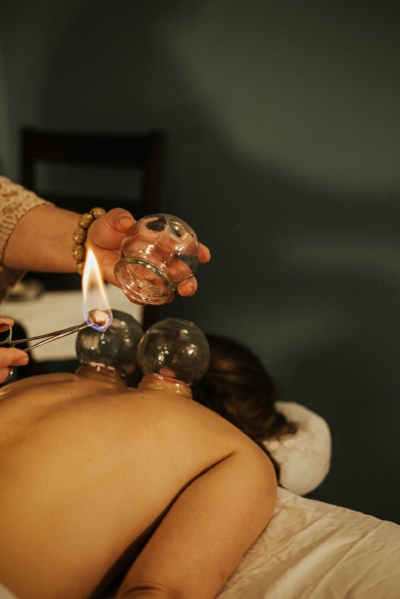Ancient Chinese Medicine
From acupuncture, cupping, moxibustion, to diet, Chinese Medicine is a holistic system designed to support your body's own natural healing ability. Based on Yin and Yang theory, your Practitioner can diagnose and treat most common ailments. Here is a short list of things we treat: Pain (acute and chronic); gastro-intestinal issues; sleep problems; adjunctive therapy for cancer patients; gynecological issues (including PMS, pelvic pain, etc.)
$170/Initial visit; or try our New Client Package is $350 for your Initial consult and 2 follow up sessions. $110 for follow up visits, depending on length of time and modality. We also offer wellness packages and discounts for active members of our studio. We do however take MVA(auto-accident) and Workers comp claims and will happily bill your PIP insurance for you for no charge. All other services require payment at the time of service. Schedule a FREE 15 Minute Consultation with one of our amazing providers below.
Do you need Acupuncture? Take the Quiz!
What is Acupuncture?
Acupuncture involves the insertion of hair thin needles through your skin at specific points on your body. A key component of traditional Chinese medicine, acupuncture is most commonly used to treat pain. Increasingly, it is being used for overall wellness, including stress management.
Traditional Chinese medicine is a whole medical system unto itself. Acupuncture is a technique used for balancing the flow of energy or life force — known as chi or qi (chee) — believed to flow through pathways (meridians) in your body. By inserting needles into specific points along these meridians or pathways, we believe that your energy flow will re-balance or reset.
In contrast, many Western practitioners view the acupuncture points as places to stimulate nerves, muscles and connective tissue. Some believe that this stimulation boosts your body's natural painkillers.
Does it Hurt?
Acupuncture is typically not as painful as you would think. The needles are hair thin and most find the experience pretty painless and even relaxing. You might have a slight prick, achey, warm, dull sensation at the insertion are but nothing like getting a shot! If you are concerned please just let us know and we will be extra gentle and can even use acupressure for those who just cannot tolerate needles.
How many Visits will I need?
Typically most patients will need 2-3 visits per week until symptoms subside. Your Acupuncturists will create a treatment plan during your first visit for you to follow to get you the best results. If you are not read to schedule your first visit or have questions about your particular case please schedule a free consultation to discuss your case specifically.
What is the difference between dry needling and acupuncture?
Dry needling is needling a myofascial trigger point. Dry needling is in fact a type of acupuncture and can be delivered by any properly licensed acupuncturist.
Why get Acupuncture done?
Acupuncture is used mainly to relieve pain or discomfort associated with a variety of diseases and conditions, including:
Fertility Enhancement
Acute and Chronic Pain Relief
Chemotherapy-induced and postoperative nausea and vomiting
Dental pain
Headaches, including tension headaches and migraines
Labor pain
Low back pain
Neck pain
Osteoarthritis
Menstrual cramps
Respiratory disorders, such as allergic rhinitis
Carpal Tunnel
Many more…
Are there any Risks?
The risks of acupuncture are low when you have a competent, licensed acupuncture practitioner. We exclusively use disposable sterile needles which makes the risk of infection very low. Common side effects include soreness and minor bleeding or bruising where the needles were inserted. Not everyone is a good candidate for acupuncture. You may be at risk of complications if you:
Have a bleeding disorder. Your chances of bleeding or bruising from the needles increase if you have a bleeding disorder or if you're taking blood thinners. This does not mean you cannot get acupuncture but it does mean your acupuncturist will take extra precautions to minimize bleeding or bruising so please let your acupuncturist know.
Have a pacemaker. Acupuncture that involves applying mild electrical pulses to the needles can interfere with a pacemaker's operation. Please let your acupuncturist know if you have a pacemaker in advance so they can avoid problems.
Are pregnant. Some types of acupuncture are thought to stimulate labor, which could result in a premature delivery. We are well trained to use only those points when necessary and will avoid those points unless needed.
How you prepare?
No special preparation is required before acupuncture treatment. You might want to have a snack before your session so as to avoid being hungry while trying to relax. Most people find acupuncture very relaxing and often we find that patients take a short nap during the session.
Do you take insurance for Acupuncture?
Payment methods accepted are cash, check, Visa, Mastercard, debit cards, and HSA cards.
For car accidents and workers' comp cases, we are happy to bill the insurance company directly; there will be NO out-of-pocket costs to you. For regular health insurance, payment is expected at the time of service, and I will provide a coded receipt or super-bill that you can submit for reimbursement.

